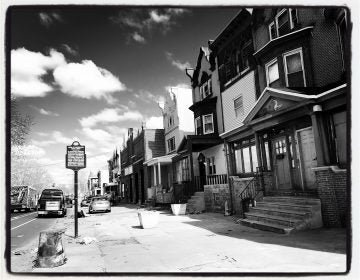BlackStar Film Festival finds a new home at Philly’s Annenberg Center
Festival creator Maori Karmael Holmes has been hired to bring cinema back to the Annenberg Performing Arts Center.

Maori Karmael Holmes, founder and executive director of BlackStar Film Festival, poses for a portrait in the Sidney Kimmel Theater at the Constitution Center on Feb. 23, 2019. (Rachel Wisniewski for WHYY)
The BlackStar Film Festival has a new home, as its creator has been named curator of film at the Annenberg Center for the Performing Arts, at the University of Pennsylvania campus.
Maori Karmael Holmes started the festival for filmmakers of color, with a focus on films by African American and African diasporic creators, in 2012. For the last several years, she has used the Lightbox Film Center screening room at the International House, at UPenn, as its main hub of operations. However, International House closed on December 31, with the intention of selling the building and reducing its programming. The Lightbox Film Center moved across town to the University of the Arts.
Last year the Annenberg hosted several BlackStar screenings. This summer the Annenberg would have been the central headquarters of the festival, were it not for the pandemic.
Holmes said that for a couple years she had been in talks with Chris Gruits, the artistic director of the Annenberg Center, on two fronts: a possible partnership between Annenberg and BlackStar, and her own role at Annenberg.
Holmes’ role at Annenberg will be both as curator-at-large for the Performing Arts Center, and as mediamaker-in-residence at the Annenberg School for Communication. In addition, the Annenberg will serve as the main location for her film festival.
“It’s a partnership,” said Holmes. “The festival is still an independent entity.”
As curator-at-large, Holmes will be creating film programs specifically for the Annenberg that go beyond the focus of BlackStar.
“This position gives a chance to think about film in other kinds of programmatic threads,” she said. “At BlackStar we’re thinking about independent filmmakers of color. What I’ll be doing at the center will be films of many different genres and makers of different backgrounds.”
Holmes wants to pull together the many film-oriented programs on the Penn campus — many independently created by student groups — so they can benefit from her expertise in curation and the resources of the Annenberg.
The Annenberg center was built in 1971 with a strong cinema component thanks in large part to Amos Vogel and his Annenberg Cinematheque screening series. Vogel was an Annenberg School faculty member and an important figure of the American film avant-garde, who died in 2012.
In recent years, however, film has been largely absent from the Annenberg as the center leaned more heavily into its namesake as a performing arts venue. Bringing film back into the fold has been on Gruits’ mind since he became artistic director four years ago.
“By bringing Maori on we’re, first of all, getting this really talented curator with a very unique perspective on contemporary film,” said Gruits. “But we’re also in a way going back to our roots.”
Despite being closed for the pandemic, Holmes is planning a screening series for the fall that will be available online. At the same time, the Annenberg is rigging up one of its smaller theaters with a four-camera setup to be able to stream live performances. Details will be made available later this summer.
As for the BlackStar festival, it will go on this year but as a virtual festival, including screenings, panels, and the filmmaker-focused social events for which it has become well known. Holmes says she is pulling together a few drive-in screening events for BlackStar, with details forthcoming.

Get daily updates from WHYY News!
WHYY is your source for fact-based, in-depth journalism and information. As a nonprofit organization, we rely on financial support from readers like you. Please give today.





